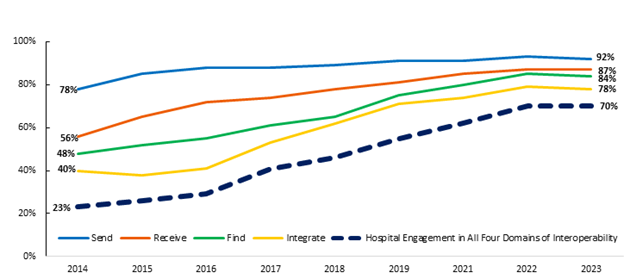
What You Should Know:
– A new Office of the National Coordinator for Health IT (ONC) brief explores advancements in electronic health record (EHR) interoperability across US hospitals and physicians, highlighting both progress and areas for continued focus.
– The ONC has tracked progress in healthcare data exchange since 2014. The data shows a substantial increase in hospitals’ ability to electronically find, send, receive, and integrate patient health information. In 2023, 70% of hospitals reported “sometimes” or “often” engaging in all four domains of interoperability, compared to just 23% in 2014.
New Metrics Focus on Routine Exchange
While this progress is commendable, the ONC emphasizes the need for even higher standards. Moving forward, data collection will focus on “routine interoperability” – the consistent exchange of health information – rather than simply “sometimes” or “often.” This more rigorous approach provides a clearer picture of hospitals achieving true interoperability.
Benefits of Routine Interoperability
The data reveals a clear link between routine interoperability and improved patient care. Hospitals achieving routine interoperability are 92% more likely to have necessary clinical information available from external providers at the point of care. This translates to better continuity of care, fewer information gaps, and ultimately, improved patient outcomes.
Physician Interoperability Lags Behind
Physician engagement in interoperability has seen a smaller increase compared to hospitals. While physicians report significant benefits from information exchange, less than 20% engaged in all four interoperability domains by 2021. However, a recent study focusing on ease of use suggests a more nuanced picture.
Physician Satisfaction with Data Access
When considering physicians who reported using information as “somewhat” or “very” easy, roughly 80% found it at least somewhat easy to access and utilize patient data for effective care. This suggests a growing comfort level with information exchange, particularly within the same EHR system. However, significant challenges remain, with only 8% of physicians finding it very easy to access information from doctors using different EHR systems.
Aiming for Widespread, Routine Exchange
The ONC acknowledges the progress made but emphasizes the need for continued improvement across all healthcare providers. Future data analysis will focus on routine interoperability as the benchmark for success. This shift reflects the importance of consistent and reliable information sharing to enhance patient care delivery.
